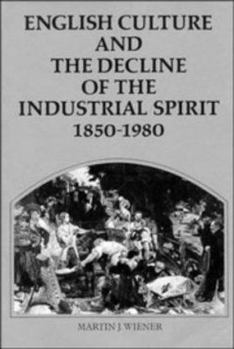English Culture and the Decline of the Industrial Spirit, 1850-1980
Select Format
Select Condition 
Book Overview
England was the world's first great industrial nation yet, paradoxically, the English have never been comfortable with industrialism. Drawing on a wide array of sources, Martin Wiener explores the... This description may be from another edition of this product.
Format:Paperback
Language:English
ISBN:0521270340
ISBN13:9780521270342
Release Date:September 1982
Publisher:Cambridge University Press
Length:240 Pages
Weight:0.75 lbs.
Dimensions:0.5" x 5.9" x 9.0"
Customer Reviews
2 ratings
'England is the country and the country is England'
Published by Thriftbooks.com User , 20 years ago
Martin J. Wiener does an excellent job describing England's lack of committment to the industrial spirit and the very real economic impact such a philosophical malaise engendered.The author logically begins his thesis by pointing to 19th Century English cultural and political elites from across the political spectrum who decried the mechanical horrors of the Industrial Revolution. From the 'philosophical radical' JS Mill to the pragmatic Conservative Prime Minister Stanley Baldwin (ironically, the son of an industrialist), Wiener displays a general consensus among the ruling and influential elites of England that industrial development is, essentially, not right for 'Little England.' Other Conservatives at the turn of the century, such as Lord E. Percy, felt that laissez-faire was best left with America as the U.S. 'was more favorably placed for her less noble experiment of unrestrained growth.'I disagree with previous Reader's (Silicon Valley) judgement that Wiener fails to provide 'provide any evidence that this diffuse anti-industrial sentiment led to government policies or economic decisions'. This is simply wrong. Chapter 6 (Images and Politics) provides a very real example of how the elites' disdain for industrial reform/innovation led to unfortunate legislative consequences: Joseph Chamberlain (Colonial Secretary of the Conservative Party) failed to pass much-needed tariff reform legislation (part of a sweeping economic program to re-energize England's fledgling industrial economy) because of ingrained political resistance to 'strenuous' economic resurgence. Further in the same chapter, Wiener points to policies for rural preservation and revivalism made by Conservatives in power. Such policies and, more importantly, deep-seeded mentalities hindered England's economic modernization as other industrial nations around her moved forward.Wiener does a great job illustrating how romantic notions of pastoral 'purity' have very real economic consequences when political leaders espouse to such views to the detriment of modernization. England's ultimate failure to fully embrace industrialism allowed other industrial nations (ie Germany, U.S., France), with no such qualms, to move forward to the top of the heap.
Good cultural history, but it falls short of its goals
Published by Thriftbooks.com User , 23 years ago
In this book, Martin J. Wiener attempts to explain Britain's general postwar economic decline by a pointing to a decline in the "industrial spirit" of English culture. This decline, he suggests, began in the nineteenth century, not long after the industrial revolution itself was in full swing. By examining literature, art, poetry, political statments, philosophy, social habits, and other cultural documents (even song and music), Wiener seeks to outline the decline of this industrial spirit over a 130-year period and thereby explain Britain's economic decline.In fact, what Wiener ends up tracing is not really a "decline in an industrial spirit", but rather the *growth of an anti-industrial spirit*. This is not quite the same thing. It's one thing to note that many people in England were (and still are) critical of the ugliness, exploitativeness, and money-mindedness of modern industrial capitalism-- and that many of them came to feel a strong nostalgia for Old England, with it's rural, pre-industrial way of life. It's quite another to show that people actually became less interested in investing in industrial enterprises, in building factories, etc. To Wiener's credit, he does show that this anti-industrial spirit was *not* limited to working-class movements or romantic poets, but that it was actually shared by some bourgeois industrialists themselves-- at least to a certain degree. (I'm not 100% convinced, though, that the millionaire factory-owner who lives in a country estate to be away from the ugliness of the industrial cities, and who lets others direct the 'grubby' details of business management and financial investment can trulybe said to have embraced an 'anti-industrial spirit'). However, Weiner fails to show that any of this led to an actual decline in enthusiasm for-- or actual investment in-- industrial enterprises. Nor does he provide any evidence that this diffuse anti-industrial sentiment led to government policies or economic decisions by anyone that would stifled economic growth and led to an economic decline (which was, of course, the whole point of the book).When all's said and done, Wiener doesn't provide a compelling explanation of Britain's economic decline. I'm convinced that this anti-industrial sentiment is very real in England, and I'm willing to believe it could be a factor in explaining Britain's postwar decline-- but I just don't think Wiener makes the case here. That said, he does provide an excellent account of the growth of anti-industrial sentiment in English culture, and as such, this book is well worth reading as a work of pure cultural history.






